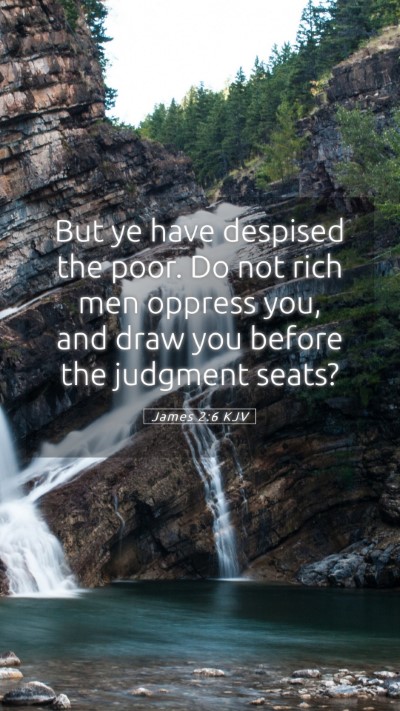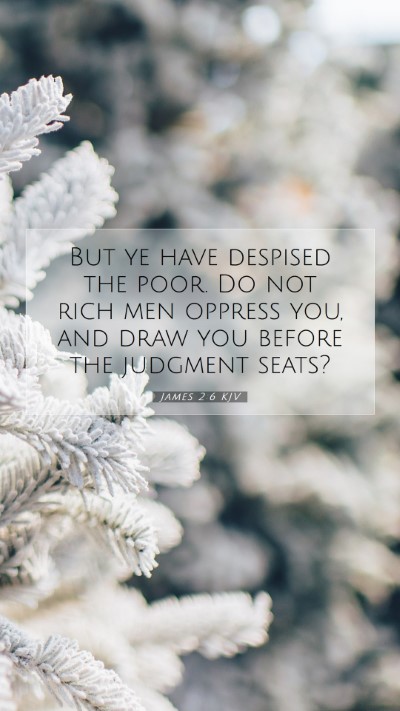Old Testament
Genesis Exodus Leviticus Numbers Deuteronomy Joshua Judges Ruth 1 Samuel 2 Samuel 1 Kings 2 Kings 1 Chronicles 2 Chronicles Ezra Nehemiah Esther Job Psalms Proverbs Ecclesiastes Song of Solomon Isaiah Jeremiah Lamentations Ezekiel Daniel Hosea Joel Amos Obadiah Jonah Micah Nahum Habakkuk Zephaniah Haggai Zechariah MalachiJames 2:6 Meaning
What is the meaning of James 2:6?
But ye have despised the poor. Do not rich men oppress you, and draw you before the judgment seats?
James 2:6 Bible Verse Meaning
Bible Verse Meaning: James 2:6
James 2:6 states, "But ye have despised the poor. Do not rich men oppress you, and draw you before the judgment seats?” This verse addresses the issue of partiality and favoritism towards the wealthy, highlighting that the rich often exert control over the poor and use their power to oppress.
Overview of the Verse
This passage speaks directly to the Christian community, warning them against the sin of showing favoritism towards the affluent while neglecting those who are less fortunate. James emphasizes the moral and ethical implications of ignoring the needs of the poor and allowing the rich to dominate.
Commentary Insights
-
Matthew Henry:
Matthew Henry notes that the act of despising the poor stems from a lack of understanding of God's values. He emphasizes that God has chosen the poor of this world to be rich in faith (James 2:5), highlighting the spiritual riches available to those often overlooked by society. The oppression by the wealthy is not just a social injustice; it reflects a deeper spiritual issue, as the rich are often the ones who persecute the righteous.
-
C. H. Spurgeon:
Although not included in your list, Spurgeon's sermons often echo similar sentiments. His insights imply that the wealth of the world should not alter our view of value in God's kingdom, which stands in stark contrast to worldly values. This perspective would suggest that those in positions of wealth should be reminded of their spiritual responsibilities towards the less fortunate.
-
Albert Barnes:
Albert Barnes emphasizes the question posed by James as both rhetorical and accusatory. He points out that those who are wealthier tend to be the oppressors and use their means to drag others into courts. Barnes encourages readers to reflect on their own biases and suggests that true faith must manifest in actions that reject favoritism.
-
Adam Clarke:
Adam Clarke provides additional historical context by discussing how oppression was commonplace in societal structures during James's time. Clarke explains that Christians were not to align themselves with those who exploit others, but instead, they should adhere to principles of equality and justice regardless of socio-economic status. This commentary emphasizes the importance of integrity and fairness in community interactions.
Application of James 2:6
The verse not only serves as a warning against partiality but also as a call to action for believers today. In the modern context, Christians are encouraged to examine their own hearts and communities for attitudes that favor the wealthy over the poor. This includes practical applications in how we treat those around us in various settings, such as Bible study groups, community outreach, and daily interpersonal interactions.
Cross References
- Proverbs 14:31: "He that oppresseth the poor reproacheth his Maker: but he that honoureth him hath mercy on the poor."
- Luke 6:24: "But woe unto you that are rich! for ye have received your consolation."
- 1 Timothy 6:9-10: "But they that will be rich fall into temptation and a snare, and into many foolish and hurtful lusts, which drown men in destruction and perdition."
Conclusion
Understanding James 2:6 within its broader scriptural context encourages believers to actively reflect on their attitudes towards wealth and poverty. The meanings derived from public domain commentaries highlight not only the ethical implications but also the spiritual principles that govern the Christian life. Engaging with this verse can be fruitful for Bible study lessons, allowing groups to explore themes of justice, equality, and the heart of the Gospel.
Further Studies
To deepen your understanding of this verse and others like it, you can utilize various Bible study tools and resources. Online platforms offer Bible study courses that focus on interpreting Scripture accurately and applying it effectively in today's world, enriching both personal and communal faith experiences.


